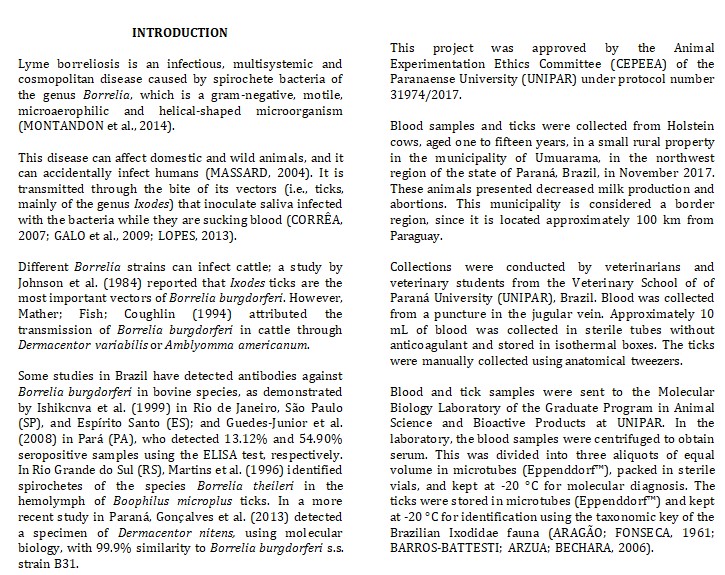Negative results for Borrelia burdgorferi in cows and ticks from a border region between Brazil and Paraguay: a case report
DOI:
https://doi.org/10.21708/avb.2019.13.4.8463Resumo
Lyme borreliosis is an infectious disease caused by bacteria of the genus Borrelia. In ruminants, most infections are asymptomatic, but the animals can present myalgia, lameness, laminitis, arthritis, synovitis, neurological symptoms, and also decreased production and abortion. The objective was to investigate Borrelia burgdorferi DNA in cows and cattle ticks on a small dairy farm in a border region. Blood samples and ticks were collected from Holstein cows with a history of decreased milk production and abortions. Borrelia burgdorferi DNA was extracted from blood samples using a commercial extraction kit, and from ticks using an alkaline hydrolysis solution for subsequent nested-PCR. Serum and tick samples did not present Borrelia burgdorferi DNA, and 100% of the ticks were identified as Rhipicephalus (Boophilus) microplus. Although this study shows negative results it contributes to understanding the epidemiology of this etiological agent in Paraná and in Brazil, since there are few studies on bovine species. The negative results of this work demonstrate that the animals and ticks researched were not exposed to Borrelia burgdorferi, however, as it is a property located in a border region, the sanitary monitoring of the herd must be performed constantly since this is a region. vulnerable to the entry of potential threats to human, animal and environmental health from vectors and pathogenic microorganisms, given the large extension of the land border with the neighboring country and which also has different health status.
Downloads

Downloads
Publicado
Edição
Seção
Licença
Autores que publicam na Acta Veterinaria Brasilica concordam com os seguintes termos: a) Autores mantém os direitos autorais e concedem à revista o direito de primeira publicação, com o trabalho simultaneamente licenciado sob a Licença Creative Commons Attribution que permite o compartilhamento do trabalho com reconhecimento da autoria e publicação inicial nesta revista. b) Autores têm autorização para assumir contratos adicionais separadamente, para distribuição não-exclusiva da versão do trabalho publicada nesta revista (ex.: publicar em repositório institucional ou como capítulo de livro), com reconhecimento de autoria e publicação inicial nesta revista. c) Autores têm permissão e são estimulados a publicar e distribuir seu trabalho online (ex.: em repositórios institucionais ou na sua página pessoal) a qualquer ponto antes ou durante o processo editorial, já que isso pode gerar alterações produtivas, bem como aumentar o impacto e a citação do trabalho publicado (Veja O Efeito do Acesso Livre).


 Esta obra está licenciada com uma Licença
Esta obra está licenciada com uma Licença 